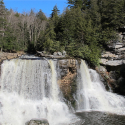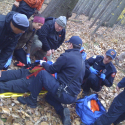On Saturday morning, I read the sad news account of the death of a South Korean exchange student a day earlier at the famous Seven Sisters Cliffs in England. Business Insider reported that Hyewon Kim, who was touring the area by herself, asked someone to take a photograph of her as she “jumped” from the cliff. Kim walked by numerous posted signs that warned her of the danger along the cliffs to find the perfect spot for her photograph, which presumably she intended to then text to family and friends back home. However, her simple hop into the air caused the ground to crumble so Kim fell 200 feet to the shore below, suffering “catastrophic injuries.” What most of us would have considered a typical lark in the outdoors is now a tragedy for a family Do you think that this is the first time that I’ve read about such […]
Read more →If I were to ask you what kills more people in the backcountry than anything else, what would you guess? Based on talks that I have had with students in our various survival and medicine courses over the years, your answer might likely be some wild creature. Topping the list of the usual suspects are bears, cougars, and snakes. I certainly cannot blame them because deaths due to such attacks are featured most prominently in the news media, not to mention that they make a good plot thread in a screenplay. After all, few movie trailers could be more dramatic and exciting than Leonardo DiCaprio fighting off a grizzly (even if it was computer-generated). But the simple (even if boring) fact of the matter is that what kills more people in the outdoors, either directly or as a significant contributing factor, isn’t wildlife (which is exceedingly rare), but rather an easily understood and […]
Read more →Last Friday, CNN news anchor, Brooke Baldwin, again interviewed True North’s own Erik Kulick on her program Newsroom. This time, she wanted to ask about his thoughts concerning the rescue of Louis Jordan, the sailor who was rescued one day earlier, approximately 200 miles off the coast of Cape Hatteras, North Carolina, after apparently spending 66 days lost at sea in a sailboat. Given that this admittedly inexperienced sailor showed none of the expected hallmarks of a castaway, like severe sunburn, blisters, profound dehydration, and weight loss — not too mention that both of Jordan’s shoulders appeared remarkably normal considering that he stated to the U.S. Coast Guard that he had broken his shoulder early on in a storm — the media grew skeptical as the story developed. So Brooke spoke to Erik to ask his opinion about Jordan’s account. Just below, then, is a transcript of their talk. And if you like, you can watch […]
Read more →
In a wilderness emergency, especially one in which you suspect that you may not be rescued within 72 hours, potable water can be critical to your survival. This is because by that point – perhaps even sooner depending upon certain factors like the weather, your level of physical exertion, and medical condition – your bodily functions begin to become impeded and your mental status impaired. So, while you may have the necessary equipment to filter and purify water, you have to first find it. Can you? Just in case you are uncertain, let me share with you a few ideas and tips to consider. Where to Look Here are a few suggestions on finding sources of water: Keep in mind the basic truism that water doesn’t flow uphill or run along the top of ridgelines, so you’ll have much better luck looking in low spots, like valleys and drainages. There, not only […]
Read more →
As I regularly explain to our students in our wilderness survival and medicine courses, one doesn’t need to be an Army Ranger or a medical professional to benefit from these types of emergency training. After all, whether it’s a mountain top, a state park, a roadside accident, or a burning building, each of us may still at any moment be called upon to protect ourselves or the lives of others from some threat. Then, thereafter, we may need to live with the consequences of our action or inaction — Or, heck, perhaps we won’t live. At the moment of truth, it really doesn’t matter so much the size of your backpack, the fancy equipment in it, or your general professional training (I’ve heard of a group cardiologists who froze when a colleague collapsed of a cardiac arrest during a conference). Rather it is your head and heart that most matters. So […]
Read more →As I regularly explain to clients during our wilderness survival courses, a lack of food in a survival situation is not necessarily a big deal. In fact, in such situations, food is a detriment as it is a stressor on the body. This is one reason why you’ll often hear survival instructors talk about the Rule of 3s — That is, one can go 3 minutes without air, 3 hours without shelter in harsh conditions, 3 days without water, and 3 weeks without food. The following news account, then, helps to underscore my point: Police in Manitoba ended their investigation today surrounding the events that caused a man to become lost and stranded in the wilderness for three weeks while hunting. Other than an apple, which he ate on Day One, he had no other food and lost 40 pounds. So, this story helps to illustrate why, of the Seven Survival […]
Read more →